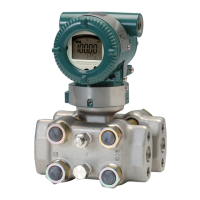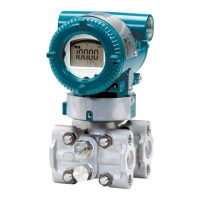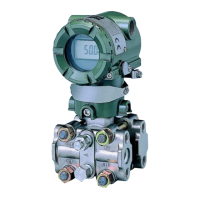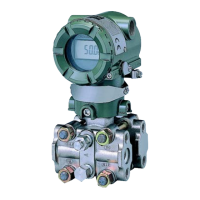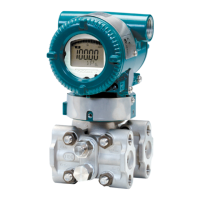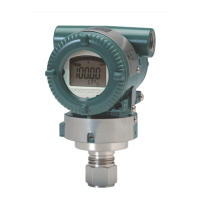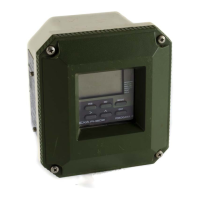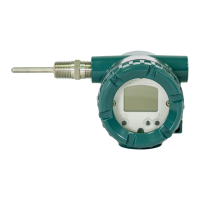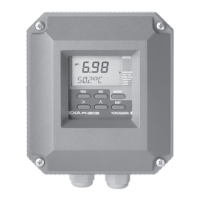<3. Parameter Setting>
3-21
IM 01C25T01-06EN
<Example>
Adjustment 4 to 20 mA output using a volt meter.
(4mA → 1V, 20mA → 5V)
1) Select “Change”.
2) Enter the value read on the voltmeter when the out-
put signal is 4mA.
In this case, enter the value of the voltage across a
250Ω resistor (1V).
3) Enter the value read on the meter when the output
signal is 20mA (5V).
4) Select “Proceed”.
5) Connect the voltmeter.
6) Output the 0% output signal and read the output
value.
7) Enter the reading of the voltmeter to the conguration
tool. (The output of the transmitter changes).
8) Conrm the voltmeter reading is 1.000.
9) If the reading on the voltmeter is 1.000, select “Yes”.
If the reading is not 1.000, select “No” and repeat
steps 6 and 7 until the voltmeter reads 1.000V.
10) Output the 100% output signal and read the output
value.
11) Enter the reading of the voltmeter.
12) Conrm the voltmeter reading is 5.000.
13) If the reading of the voltmeter is 5.000, select “Yes”.
If the reading on the voltmeter is not 5.000, select
“No” and repeat steps 10 and 11 until the voltmeter
reads 5.000V.
3.3.8 External Switch Mode
Follow the procedure below to enable or inhibit zero
point adjustment by means of the zero-adjustment
screw on the transmitter.
This is set to “Enabled” when the instrument is
shipped.
To change the mode, follow the procedure below.
• Procedure to call up the display
DD and DTM
(excluding EJX_
HART 5[1.2])
[Root Menu] → Detailed setup →
Device information → Field device
info → Ext SW
EJX_HART 5[1.2]
DTM
Conguration → Device
information1 → Ext SW
Enabled Enable the external zero point
adjustment
Disabled Disable the external zero point
adjustment
3.3.9 CPUFailureBurnoutDirectionand
Hardware Write Protect
There are two slide switches on the CPU assembly
board. One sets the burnout direction at CPU
failure, and the other sets a write protection function
which disables parameter changes through
the use of a handheld terminal or some other
communication method.
HIGH LOW
CPU assembly
Slide switch
Burnout direction switch
Write protection switch
Write Protection
Switch Position
Burnout Direction
Switch Position
BO H L
WR E D
H L
E D
H L
E D
H L H L
Hardware write protection switch (WR)
Burnout direction switch (BO)
Burnout Direction
Write Protection
YES
(Write disabled)
NO
(Write enabled)
F0307.ai
The parameter of AO alm typ parameter displays
the status of analog output if a CPU failure occurs.
In case of a failure, communication is disabled.
Standardspecicationsorwithoptioncode/C3
The burnout direction switch is set to “HIGH”. If a
failure occurs, the transmitter outputs a 110% or
higher signal.
With option code /C1 or /C2
The burnout direction switch is set to “LOW”. If a
failure occurs, a –5% or lower output is generated.
To conrm the burnout direction at the CPU failure,
follow the procedure below.
• Procedure to call up the display
DD and DTM
(excluding EJX_
HART 5[1.2])
[Root Menu] → Detailed setup
→Output condition → Analog
output → AO alm typ
EJX_HART 5[1.2]
DTM
Conguration → Analog output →
AO alm typ
High Burnout direction is set to High
Low Burnout direction is set to Low
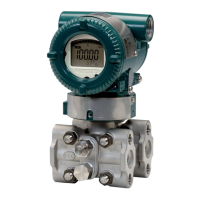
